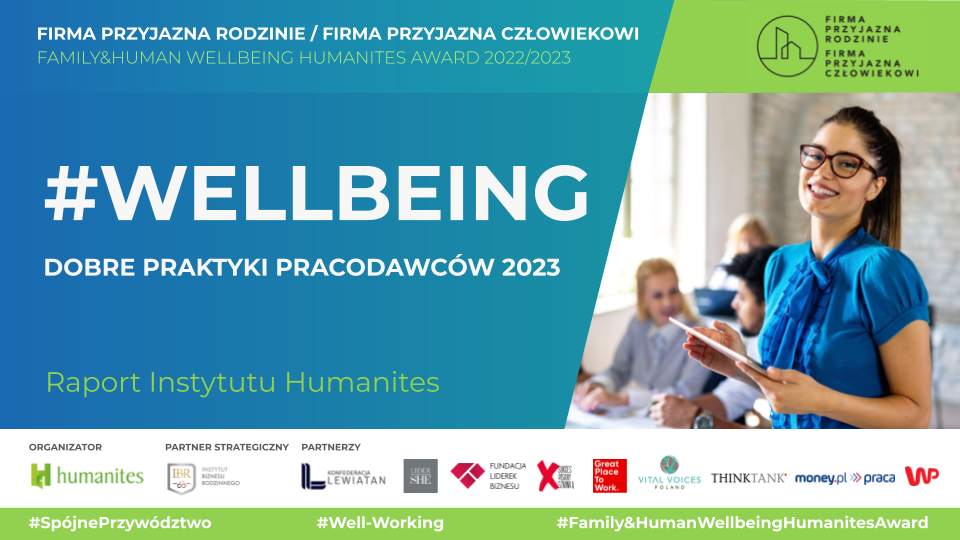#WELLBEING Best Practices Report 2023

HOW ARE TOP EMPLOYERS WINNING THE WAR FOR TALENT IN THE AGE OF AI?
Only 28% of employees at large companies have a high sense of meaning at work – these figures come from the latest edition of the Humanites Institute’s #WELLBEING Best Practices Report – People and Technology. In small companies, this result is more than twice as high (64%). Much more often a high sense of purpose is declared by people in managerial positions (52%) than by other employees (32%).
More and more companies are involving employees in creating processes and an organizational culture that promotes well-being. Companies increasingly say they are conducting surveys of employees’ needs and expectations regarding their work-life balance (85.7% vs. 80% year-on-year). The level of psychological support from employers for people in difficult life situations is also increasing (85.7% vs. 70%).
The third edition of the #WELLBEING Best Practices Report has just been released. The report summarizes data collected in the Family/Human Friendly Company competition, in which the employment strategy of top employers is analyzed and evaluated.
This year, the authors highlighted the importance of a sense of meaning at work, which is one of the important factors in preventing depression (on average, 37% of employees feel a high sense of meaning at work, with 64% in small companies and only 28% in large companies). A sense of meaning is also one of the key values mentioned by employees in the survey, along with issues such as a good team atmosphere and contact with superiors, the ability to combine work and private life, or the opportunity to develop and influence decisions at the company.
Another important trend is the growth of programs dedicated to fathers. More and more companies are collecting data on those eligible for paternity leave (up from 25% to 33%). Two-thirds of companies said they inform and encourage fathers to take advantage of this benefit. This is particularly important in the context of labor law changes related to the entry into force of the EC Work-life Balance Directive, which introduce, among other things, 9 weeks of non-transferable parental leave for each parent. It is also important to note the recognition of the potential of older employees, e.g. as mentors in intergenerational mentoring programs, which are gaining in popularity.
The report includes many examples of good practices successfully implemented in companies of different sizes and industries, as well as a summary of the employee survey, so it can inspire specific actions within the company to build employee well-being and its impact on the social ecosystem. Among the practices highlighted in the report were an extensive oncology prevention program at a manufacturing company (attendance rate of over 67%), an effectively created remote work feedback culture and an engaging employee volunteer program. Knowledge in this area is also becoming more and more necessary due to the obligation to report it introduced by the CSRD, which will cover a wider and wider group of entities every year. They will be obliged to present their ESG, or Environmental, Social and Corporate Governance, activities.
Zofia Dzik, impact investor, innovator, and founder of the Humanites-Human and Technology Institute, commented on the report with the words:
“High social capital is crucial for the development of an innovative economy. The more the technological transformation accelerates, the greater will be the competition between companies for talent. At the same time, it is hard not to notice that people today are in poor mental condition, experiencing loneliness, depression. We have seen a lack of understanding and alignment of the mutual needs of employers and employees in 2022 through a wave of great resignation or the phenomenon of “quiet quitting.”
The Employer Best Practices Report was based on data collected in last year’s Family/Human Friendly Company competition. 1,330 employees of companies in 13 industries took part in the survey.
Report: https://www.humanites.pl/wp-content/uploads/2023/04/Raport-Dobrych-Praktyk-Pracodawcow-2023.pptx-1.pdf
Competition website: https://2godzinydlarodziny.pl/konkurs-firma-przyjazna-rodzinie-firma-przyjazna-czlowiekowi
Contact:
Katarzyna Lorenz
Director of communications and PR of the Humanites Institute
phone: +48 505 017 957
e-mail: katarzyna.lorenz@humanites.pl